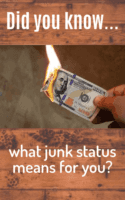Have you heard people talking about South Africa nearing junk status and not known what they were meaning? Perhaps you think that ‘junk status’ has something to do with a rubbish heap or our refuse policy, or perhaps you’d rather just think about something else.
Well, you’re probably not alone… big economic issues are complex and complicated. However, it is important to be as informed about our country and our world as possible. So here is a short explanation on what junk status means.
There are three major credit rating agencies worldwide: Standard and Poor’s, Moody’s, and Fitch. One of their major jobs is to measure how well a country’s government is able to pay back borrowed money.
Many countries have to borrow money in order to finance the major investments that they want to make in their countries. And so the cost of their borrowing (i.e. the interest rates that they can access) is related to their credit rating.
In order to work out a credit rating, the agencies need to determine how risky they believe lending money is to a particular country’s government.
So, while the ratings agencies do not measure the economic health of a country, they do need to take a range of economic and social factors into account in order to determine how likely a government is to repay its loans.
Some of the factors that they look at are: political stability; economic growth; and, current national debt. This means that the rating agencies will look at how much money a country’s government is already owing investors, for how long they have borrowed that money, and how large the interest payments are as a percentage of a country’s Gross Domestic Product or GDP. The GDP is a calculation of the amount of money that a country produces in goods and services.
The credit ratings agencies can give country’s governments ratings that range from a high AAA to a DDD (or similar). However, anything below a BBB – is considered to have ‘junk status’ and not ‘investment grade’ material. This means that the cost of borrowing is much higher for a government.
It is no surprise that South Africa has been through turbulent times in the last couple of years, and that there is growing political instability with service delivery protests occurring daily in towns countrywide. In addition, the exposure of major incidents of government corruption have also impacted on external confidence in our country’s leadership. These factors, coupled with our high levels of unemployment and low economic growth, have made South Africa a risky investment opportunity.
Two of the international credit ratings agencies – Standard and Poor’s, and Fitch – downgraded South Africa’s credit rating to that of junk status in April 2019. Moody’s, the third major rating agency, has retained South Africa at a low investment grade rating but it is uncertain for how long they will remain.
You may still ask the question, so what does it mean to me?
Well, the lower the credit rating, the more government has to pay in interest on whatever it borrows. This means that it has less to spend on social initiatives and infrastructure. In order to cover its debt, government has to make more money, and it gets this through higher taxes, so it means that tax-paying businesses and individuals will be under even greater strain to cover the bill.
It can also cause the value of the Rand to depreciate (lose value) against other currencies. This means that all imported goods (like oil, etc) become more expensive. Again, that hits the pockets of ordinary citizens as the cost of transport increases and so all goods become more expensive. If there is too much inflation, it may mean that the Reserve Bank then needs to increase the interest rate, and this has an impact on the cost of motor cars, house mortgages, and all other long-term loans.
Ultimately it means that the cost of living will increase and this will stress ordinary citizens even more, particularly those who are reliant on the social services provided by government.
Remember, however, that there are other countries with a similar investment status, such as Vietnam, Russia, Portugal, Ghana and Nigeria. And, also that the ratings agencies are continuously evaluating global and country-specific events, so the rating is not set in stone and there is an opportunity for South Africa to improve in the future, if it is able to demonstrate clean government, economic growth and jobs, better education and prospects for its citizens, and strong institutions.
Tell us: What do you think would be a good thing for the government to do to get a better rating?
 TshWi-Fi
TshWi-Fi
